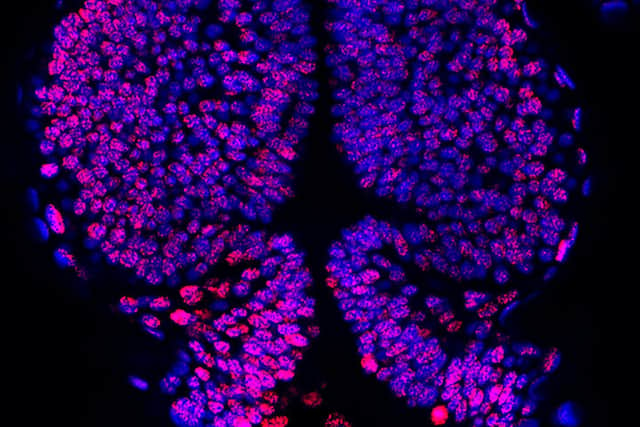Exotic fish clues aid cancer and dementia treatment in pioneering Yorkshire study
The University of Bradford said they have uncovered a "vital protection mechanism" in the DNA of zebrafish that could protect humans in later life and make diseases like cancer and dementia easier to treat.
Lead author Professor Sherif El-Khamisy, from the University of Bradford, told The Yorkshire Post: "This study highlights the power of zebrafish for the rapid discovery to find new treatments for cancer and dementia.
Advertisement
Hide AdAdvertisement
Hide Ad"It is one of the most important projects that we have done, in the last 10 years."


A Zebrafish's genome is very similar to that of humans, and scientists used cells from the popular aquarium fish to study how the protection process takes place.
"Zebrafish is a unique organism - that is very understudied for human research, " explained Professor El-Khamisy, the director of the Institute of Cancer Therapeutics, at the university.
He added: "The genome shares a very good similarity with humans - meaning all discoveries can be easily translated to humans."


Advertisement
Hide AdAdvertisement
Hide AdAs part of the four year study scientists looked at how so-called ‘DNA breaks’ caused by things like disease, the treatment of diseases such as cancer, poor diet and other external factors, are repaired by the body.
Researchers discovered a marked difference in how the process of repairing broken DNA works in early and later life and subsequently identified a ‘pathway’ which might help better protect DNA in adulthood, when studying the zebrafish.
Findings from the project could help scientists develop new treatments for diseases including cancer and dementia.
Professor El-Khamisy said: "Protecting the genome from damage is critical to prevent diseases associated with ageing such as cancer and dementia.


Advertisement
Hide AdAdvertisement
Hide Ad"We removed an important genome protection pathway in fish and examined its impact across the lifespan.
"Protecting genomic integrity is fundamental to prevent disease, especially diseases associated with old age such as cancer and dementia.
"Thus, understanding how these protection mechanisms occur is important."
The next step is to use the zebrafish models generated in this study to screen for drugs or dietary supplements that could promote a healthier life at an old age.


Advertisement
Hide AdAdvertisement
Hide AdScientists will also look at the role played by certain enzymes in the repair of DNA, with the long term aim to be able to move to trial in humans.
Professor El-Khamisy added: "Using the zebrafish model will allow scientists to do screening to find these vital drugs... Once we have a positive hit from the screen we can take the next step.
"With this breakthrough we have identified this new pathway - from here we can push on, and utilise this knowledge to develop new drugs that would treat cancer and delay or prevent dementia."
The study is published in the science journal Science Advances.
______________
Support The Yorkshire Post and become a subscriber today.
Advertisement
Hide AdAdvertisement
Hide AdYour subscription will help us to continue to bring quality news to the people of Yorkshire. In return, you'll see fewer ads on site, get free access to our app and receive exclusive members-only offers. Click here to subscribe.
Comment Guidelines
National World encourages reader discussion on our stories. User feedback, insights and back-and-forth exchanges add a rich layer of context to reporting. Please review our Community Guidelines before commenting.
